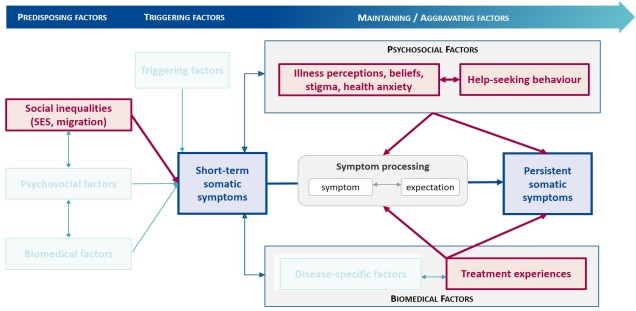SOMA.SOC
Social Inequalities in Aggravating Factors of Somatic Symptom Persistence
Background
Socioeconomic status (SES, i.e. education, income, and/or occupational position) and migration are important social determinants of health. Regarding persistent somatic symptoms (PSS), there are a few studies investigating inequalities according to SES and migration. These studies indicate that somatic symptoms are more prevalent among individuals with a low SES and a migration background. However, factors explaining social inequalities in PSS are largely unknown. It is expected that aggravating factors of PSS like illness perception, illness beliefs (health literacy/stigma), illness behaviour, and health anxiety play an important role for this explanation.
Aims
The current study will examine social inequalities (according to SES and migration) in factors contributing to PSS in two different conditions: IBS and fatigue. In this regard, the following aggravating factors will be explored: illness perception, knowledge and beliefs about the symptoms, illness and treatment experiences, illness behaviour, and health anxiety.
Working programme
In order to gain a comprehensive insight in social inequalities in aggravating factors, the project will collect both quantitative and qualitative data. Quantitative data will be gathered via a representative telephone survey in Germany (N=2,400). With a vignette design depicting patients varying in sex, condition (IBS/fatigue), occupational status (low/high), and migration (yes/no), public knowledge and beliefs (e.g. health literacy), attitudes (stigma), and personal experiences with the condition (e.g. somatic symptom burden) will be explored. In combining a vignette design with a survey, social inequalities will be examined from two perspectives: as a social characteristic of the person in the vignette and of the respondents. Complementary, longitudinal qualitative interviews will be conducted with patients (n=32 at three time points, resulting in N=96 interviews) who will also vary according to sex, condition, occupational status and migration. Patients will be recruited from primary care practices in Hamburg. The interviews will cover origin and development of the condition, coping and help-seeking as well as social interactions and perception of the disease by others (e.g. perceived stigma). The longitudinal design will allow to depict inequalities in the course of symptoms and in changes of experiences over time.
Expected impact
We expect inequalities in factors contributing to symptom persistence in IBS and fatigue according to SES and migration status. The results will help us to understand and explain inequalities in PSS and thus, will provide an insight into the social context of PSS. The project will contribute to the overall project objectives since SES and migration are predisposing factors that may have an impact on the chronification of PSS. Expected results can be integrated into concepts of prevention and treatment of PSS, e.g. by improving public knowledge and reducing stigma.




